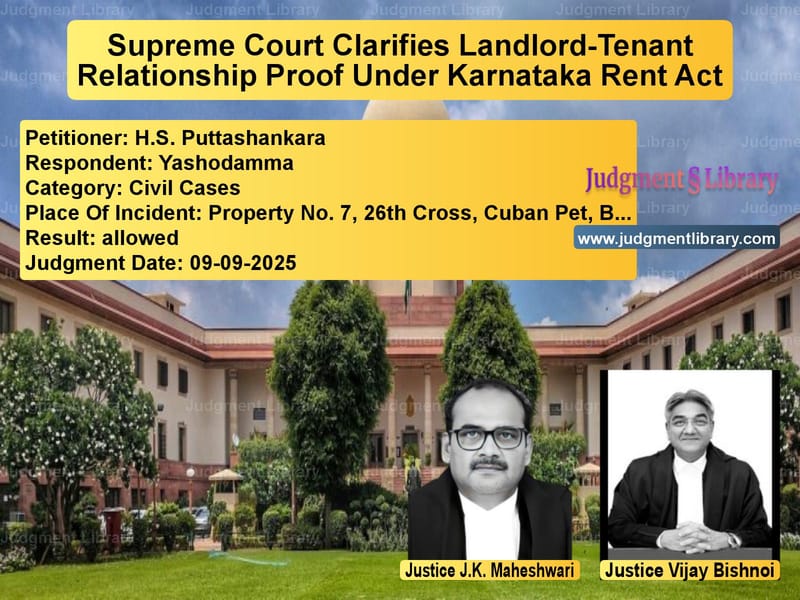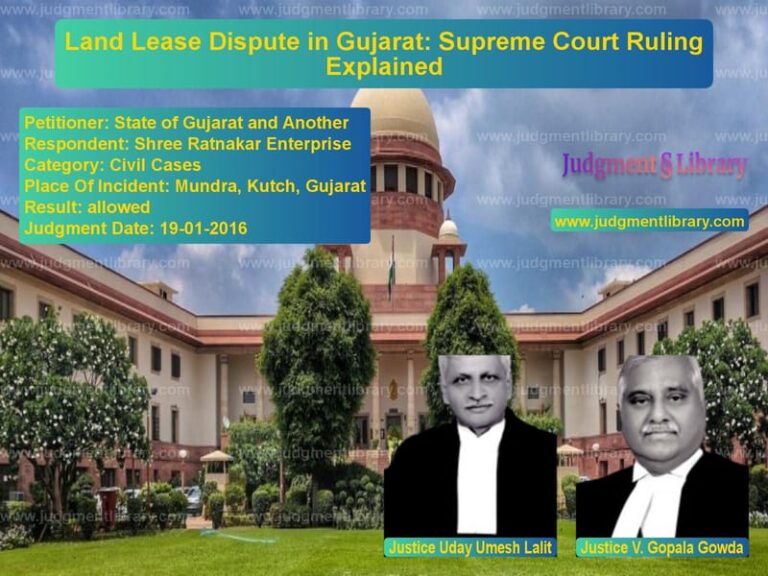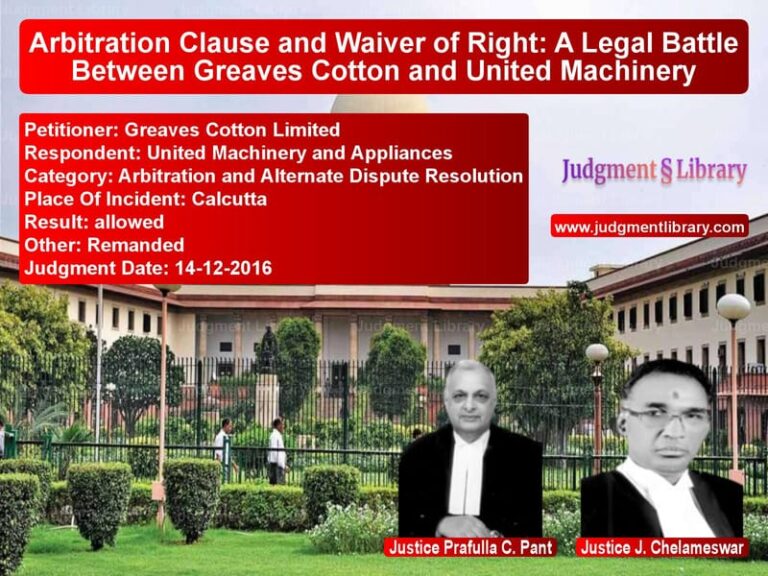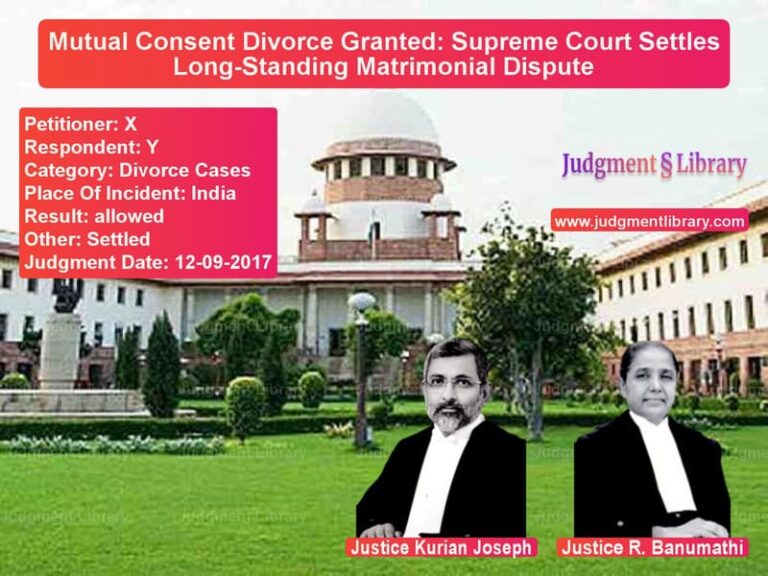Supreme Court Clarifies Landlord-Tenant Relationship Proof Under Karnataka Rent Act
In a significant ruling that clarifies the legal requirements for establishing landlord-tenant relationships in eviction cases, the Supreme Court of India recently overturned a Karnataka High Court decision and restored a Rent Controller’s eviction order. The case between H.S. Puttashankara (appellant-landlord) and Yashodamma (respondent-tenant) centered around the crucial question of what constitutes sufficient evidence to prove a landlord-tenant relationship under the Karnataka Rent Act, 1999.
The dispute involved property No. 7, 26th Cross, Cuban Pet, Bengaluru, which had been the subject of litigation spanning multiple generations. The appellant claimed that the respondent was a tenant in the property that originally belonged to his great-grandfather, Sri Banappa, and had devolved to his legal heirs. The respondent, however, contested the very existence of a landlord-tenant relationship, arguing that the property actually belonged to Ankalappa Mutt and that Sri Banappa was merely a trustee, not the owner.
The Legal Battle Through Various Courts
The eviction proceedings began when the appellant filed a suit for eviction on October 7, 2016, under Section 27(2)(a)(e)(g) and (o) of the Karnataka Rent Act, 1999. The Rent Controller, after considering the available evidence, concluded that the landlord-tenant relationship had been established between the parties and allowed the eviction petition, directing the respondent to vacate the suit property.
The Rent Controller’s approach was practical and legally sound. The Court noted that “the question of title was not looked into in detail considering the scope in eviction proceedings which is limited to look into landlord and tenant relationship.” This reflects the established legal principle that rent controllers need not delve deep into title disputes when the immediate issue is the existence of a landlord-tenant relationship.
However, the respondent challenged this decision before the Karnataka High Court, which set aside the Rent Controller’s order. The High Court took a different view, noting that “no positive documentary evidence has been brought to prove Sri Banappa was indeed his great grandfather, however, failed to prove his lineage and ownership.” The High Court was also influenced by the fact that the respondent’s son had denied his signature on the rent receipts, leading the Court to conclude that the landlord-tenant relationship didn’t exist.
The Supreme Court’s Analysis of Section 43
The Supreme Court’s judgment primarily revolved around the interpretation of Section 43 of the Karnataka Rent Act, 1999, which specifically deals with disputes about landlord-tenant relationships. The Court extensively analyzed this provision, which states:
“43. Dispute of relationship of landlord and tenant. – (1) where in any proceeding before the Court, a contention is raised denying the existence of relationship of landlord and tenant as between the parties it shall be lawful for the Court to accept the document of lease or where there is no document of lease, a receipt of acknowledgement of payment of rent purported to be signed by the landlord as prima-facie evidence of relationship and proceed to hear the case. (2) Where, – (a) the lease pleaded is oral and either party denies relationship, and no receipt or acknowledgement of payment of rent as referred to in sub-section (1) above is produced, or (b) in the opinion of the Court there is reason to suspects the genuine existence of the document of lease or the receipt or acknowledgement of payment of rent. the Court shall at once stop all further proceedings before it and direct the parties to approach a competent Court of civil jurisdiction for declaration of their rights.”
Read also: https://judgmentlibrary.com/supreme-court-upholds-property-rights-in-land-dispute-case/
The Court explained that “on reading of the aforesaid, it is clear that whenever there is a dispute with respect to existence of landlord-tenant relationship, it shall be lawful for the Court to accept the document of the lease and in absence thereof, a receipt of acknowledgment of payment of rent purported to be signed by the landlord as prima-facie evidence of relationship and proceed to hear the case.”
The Critical Evidence: Rent Receipts
The Supreme Court found that the appellant had produced original rent receipts, particularly one dated July 20, 2015, issued to the respondent for rent collected for the period from February 1, 2013, to May 31, 2014. The Court observed that “the original rent receipts issued by appellant-landlord were brought on record, discharging the initial burden as contemplated in Section 43.”
The Court emphasized that “when the initial burden as per mandate of Section 43 of the 1999 Act was discharged by the appellant-landlord by producing the rent receipts acknowledging the payment of rent by the respondent-tenant qua the suit property, the Court rightly proceeded with hearing of the case and adjudicated the matter on merits.”
High Court’s Error in Revisional Jurisdiction
The Supreme Court strongly criticized the High Court’s approach, stating that “the High Court in its own wisdom, misdirected itself in exercise of revisional jurisdiction in setting aside the order of the Rent Controller on the premise that jural relationship of landlord-tenant does not exist between the parties because the appellant-landlord wasn’t able to prove his lineage and relationship with Sri Banappa, who was purportedly the original owner of the suit property.”
The Court further noted that “the High Court in reaching a conclusion contrary to the Rent Controller, conducted a fact-finding exercise, which as per settled law ought to have been avoided in revisional jurisdiction.” This highlights an important legal principle about the limited scope of revisional jurisdiction, which should not involve re-examining factual findings unless there’s a clear error apparent on the face of the record.
Distinction Between Relationship and Title
One of the key aspects clarified by the Supreme Court was the distinction between establishing a landlord-tenant relationship and proving absolute title to the property. The Court explained that “only in case where the lease is oral in nature and party denies the jural relationship and no receipt or acknowledgement of payment of rent is produced, or the Court suspects the genuineness of the documents, the Court is bound to stop further proceedings and refer the parties before the competent Court for adjudication of their title, which implies that Rent Controller was not empowered to adjudicate the dispute related to title between the parties.”
The Court also referred to the definition of ‘landlord’ under Section 3(e) of the 1999 Act, which includes “a person who for the time being is receiving or is entitled to receive, the rent of any premises, whether on his own account or on account of or on behalf of or for the benefit of any other person or as a trustee, guardian or receiver for any other person.” This broad definition emphasizes that a landlord doesn’t necessarily need to be the absolute owner but can be anyone entitled to receive rent.
Historical Context and Previous Litigation
The Supreme Court also considered the historical context of the property dispute. The Court noted that “the mother of the respondent namely Mysore Lingamma was a tenant in the suit premises, which is reflected from the finding given by Rent Controller in HRC No. 1971/1980, i.e., eviction petition filed by appellant’s father H.S. Shankarnarayana against respondent’s mother Mysore Lingamma qua the same suit premises, wherein it was admitted by Mysore Lingamma that appellant’s father had been collecting rent from her.”
This historical evidence provided additional context supporting the appellant’s claim of an established landlord-tenant relationship that had continued through generations.
Final Ruling and Legal Implications
In its concluding remarks, the Supreme Court held that “having said so, once the initial burden was discharged by the appellant producing the rent receipts issued by him, the Rent Controller was justified in proceeding with the hearing of the case. The High Court, in revisional jurisdiction, ought to have appreciated the same in light of Section 43 of the 1999 Act before setting aside the order of Rent Controller, which, in our view, has not been duly considered.”
The Court allowed the appeal, set aside the High Court’s order, and restored the Rent Controller’s eviction order. This judgment reinforces the statutory scheme under the Karnataka Rent Act, 1999, which provides a clear mechanism for dealing with disputes about landlord-tenant relationships. It emphasizes that rent receipts constitute prima facie evidence of such relationships and that Rent Controllers should proceed with eviction cases when such evidence is produced, without getting entangled in complex title disputes that are better suited for civil courts.
The ruling provides important guidance for both landlords and tenants in Karnataka, clarifying the evidentiary requirements for establishing landlord-tenant relationships and the proper scope of revisional jurisdiction in rent control matters. It strikes a balance between protecting tenants from arbitrary eviction and ensuring that legitimate eviction proceedings aren’t derailed by tangential title disputes.
Petitioner Name: H.S. Puttashankara.Respondent Name: Yashodamma.Judgment By: Justice J.K. Maheshwari, Justice Vijay Bishnoi.Place Of Incident: Property No. 7, 26th Cross, Cuban Pet, Bengaluru.Judgment Date: 09-09-2025.Result: allowed.
Don’t miss out on the full details! Download the complete judgment in PDF format below and gain valuable insights instantly!
Download Judgment: h.s.-puttashankara-vs-yashodamma-supreme-court-of-india-judgment-dated-09-09-2025.pdf
Directly Download Judgment: Directly download this Judgment
See all petitions in Landlord-Tenant Disputes
See all petitions in Property Disputes
See all petitions in Judgment by J.K. Maheshwari
See all petitions in Judgment by Vijay Bishnoi
See all petitions in allowed
See all petitions in supreme court of India judgments September 2025
See all petitions in 2025 judgments
See all posts in Civil Cases Category
See all allowed petitions in Civil Cases Category
See all Dismissed petitions in Civil Cases Category
See all partially allowed petitions in Civil Cases Category







